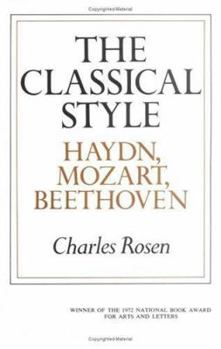The Classical Style: Haydn, Mozart, Beethoven
Select Format
Select Condition 
Book Overview
This outstanding book treating the three most beloved composers of the Vienna School is basic to any study of Classical-era music. Drawing on his rich experience and intimate familiarity with the works of these giants, Charles Rosen presents his keen insights in clear and persuasive language.
Format:Paperback
Language:English
ISBN:0393006530
ISBN13:9780393006537
Release Date:October 1972
Publisher:W. W. Norton & Company
Length:480 Pages
Weight:1.41 lbs.
Dimensions:0.9" x 6.0" x 9.3"
Customer Reviews
5 ratings
Classic writing about Classical music
Published by Thriftbooks.com User , 21 years ago
Charles Rosen by now has attained a place among musical analysts on a par with the likes of Tovey and Grout, though his style is very different from either of these luminaries. Taking the music of Haydn, Mozart and Beethoven as the pinnacle of the musical style that developed in the late eighteenth-century, Rosen explains how around 1775 there was a decisive shift away from the High Baroque style of Bach and Handel, and why this new music was different. After his general introduction to the style most of the book explores different genres, symphony, opera, concerto and string quartet among them, to create a lucid and multi-faceted picture of how these three great composers approached and solved common musical and formal problems. The new edition adds a preface that addresses criticisms of the original book and an additional late chapter on Beethoven.Rosen's writing, though it can be dense and repetitive, at its best is unmatched in its ability to relate analysis to what actually is heard by a listener. To this end, an ability to read and understand the copious and detailed musical examples is essential to fully grasping his points--this book is not for the casual amateur. But to those willing to do the work, The Classical Style remains as richly rewarding after three-plus decades as when it first appeared. As another reviewer has mentioned, it is a book one returns to again and again simply for the sheer pleasure of reading it.
Great Place to Start
Published by Thriftbooks.com User , 22 years ago
This book stimulated my interest in trying to figure out how music works more than anything else I have ever read. Sure, it is not the latest word, the most comprehensive or closely argued, but to get the interested amatuer started down the path of analysis of musical forms, why it sounds good, and what the big three Classical Era composers did to create a large chunk of our western musical heritage, this is the place to start. Rosen steered me toward many, many other books, cited in his bibliography and notes, on related topics, such as sonata form, how it works and does not. Sure, scholars can quibble and somebody else could and should write a followup to answer the complaints, but until then, Rosen is the place to start. His other books are just as good, but not as enjoyable. Dense, you bet, but worth it.
Tough sledding, but worth it
Published by Thriftbooks.com User , 23 years ago
As a music lover with a superficial knowledge of the technical aspects of music-making, I found this book to be a real challenge. It took me several attempts over the course of a couple of years to get through it. But having expended that effort, I can say that every minute was worth it. I now have a good understanding of what "classical" music (in the stricter definition of "classical") is about, and why its three great Viennese exponents were such masters. I now can listen classical music -- indeed, to any common-practice period music -- with much more insight, understanding, and enjoyment than I could heretofore.
Rosen's The Classical Style: Haydn, Mozart, Beethoven
Published by Thriftbooks.com User , 24 years ago
I am not a Classical Music Expert but I am slowly learning it (most of my book reviews are in mathematics and physics). One of the reviewers criticizes Rosen for some technical reasons that I cannot evaluate. However, I do know that many universities recommend Rosen's book, so the critic is not entirely without his own critics. I find this book endlessly engrossing, as some of the reviewers have. You cannnot come away from this book without understanding many of the main differences between and among Haydn, Mozart, and Beethoven, and between Classical, Baroque, and Romance music. I was especially interested to find that Beethoven, widely touted as an immoral person in some of the popular media, was in fact a person of great moral character (and the popular impression of Mozart seems to be wrong too, although there is less information on this). Those who believe that creative genius is stimulated by severe suffering (Beethoven, Van Gogh in art, Godel in mathematical logic, Galileo in physics and astronomy, etc.) will find much material in this book that seems to indicate the accuracy of this theory more or less. This is also a book that tells you what Haydn learned from Mozart and Mozart from Haydn, what Beethoven thought of Mozart and Schubert, what classical music learned from Baroque music and so on.
Awe-inspiring
Published by Thriftbooks.com User , 25 years ago
This is not a book to be read casually -- it's that rare type of book that is worthy of studying and rereading. The author does a great job of conveying the depth of his knowledge.





